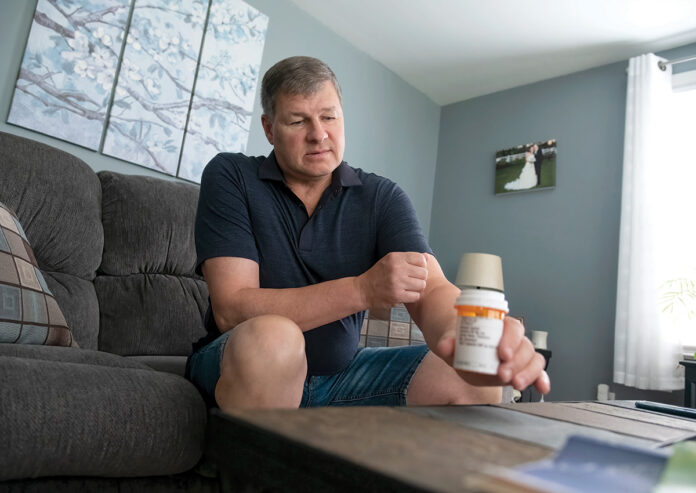Dizziness, memory loss, anxiety and a perpetually swollen left foot and ankle are among the side effects Normand Audette has experienced from taking an anti-cancer drug.
It’s uncomfortable, even painful at times, but Audette, 62, who recently marked six months in remission from stage 4 lung cancer, feels lucky. He avoided the typical chemotherapy route, administered through an IV, in favor of a less-harsh oral medication.
“I hate needles,” the Cumberland resident said. “And I didn’t want to lose my hair, my dignity. Chemo makes you look like death warmed over.”
But the tests that helped doctors diagnose and prescribe a treatment came at a hefty cost: $8,400 to study Audette’s biopsied lung tissue. When Audette, who was forced to leave his forklift operator job after getting sick, received the bill, he had no idea how he would pay for it. His insurance refused to cover it.
His predicament is not unique.
Biomarker testing – studying of blood or tissue samples for abnormalities – is increasingly recognized as an effective way to diagnose and treat cancer. When a biomarker is identified in a cancer through molecular or genetic testing, it can tell doctors what makes the cancer grow, and that information can be used to come up with the most effective treatment, such as in Audette’s case.
But many private insurance companies and state Medicaid programs lack, or limit, coverage of such tests.
That includes Rhode Island, where 80% of commercial health insurance clients’ plans don’t cover the full extent of biomarker testing recommended by oncologists, according to a 2022 study published in the Journal of Personalized Medicine.
But that’s going to change.
A new state law will soon require private insurers and state Medicaid to cover these tests. The law, which was approved by legislators in the last session and signed by Gov. Daniel J. McKee, doesn’t take effect until January 2024 because insurance companies wanted more time to prepare for the coverage change, according to state Sen. Maryellen Goodwin, D-Providence, who sponsored the Senate bill on behalf of the American Cancer Society.
Arizona and Illinois are the only two other states that have laws on biomarker coverage on their books.
How many insurers will have to change their plans in Rhode Island – and at what cost to them and their members – is unclear.
A review of existing coverage documents submitted to the R.I. Office of the Health Insurance Commissioner does not show any plans that include as broad of coverage for biomarker testing as the new law requires, according to Cory King, the agency’s chief of staff. However, that doesn’t mean insurers aren’t providing some coverage for biomarker testing, King said in an email.
At least one insurer, Blue Cross & Blue Shield of Rhode Island, said it has provided “extensive” coverage of these tests, according to spokesperson Richard Salit. Salit declined to provide details about how many plans or members included this coverage, and whether it matched what the new law requires.
Other insurers, including Neighborhood Health Plan of Rhode Island, UnitedHealthcare of New England Inc. and Tufts Health Plan did not answer specific questions about their policies – existing and upcoming – for biomarker testing.
Also fuzzy are the financial impacts of the law, both for insurers and their members. None of the companies contacted by PBN were willing to discuss costs, and the state health commissioner’s office did not have financial estimates available yet.
At least one industry group opposed the biomarker measure.
America’s Health Insurance Plans, a national association representing private, Medicare and Medicaid providers (including Neighborhood Health and Tufts), warned in written testimony to the R.I. House Health & Human Services Committee that a coverage mandate would drive up premiums. The association did not return inquiries for comment for this story.
But a 2022 actuarial analysis by the international actuarial firm Milliman and cited by the American Cancer Society estimated the law would increase costs by 5 to 9 cents per member per month. Based on the state’s Medicaid enrollment of 346,699 people, Milliman estimated the state would have to pay between $17,335 and $31,203 more per year to include biomarker testing in its government health care plans.
A separate, 2020 study by CVS Health Corp. also found that spending more on biomarker testing upfront can “significantly” reduce the cost of lung cancer care – saving more than $8,500 per patient by using blood and tissue testing to prescribe more-specific treatments.
But the law isn’t really about the costs, it’s about giving people access to the best quality care, according to Cori Chandler, government relations director for the American Cancer Society Cancer Action Network in Rhode Island.
“Health care coverage is really failing to keep pace with innovations in advancement and treatment,” Chandler said. “This aligns the coverage with science. It really can be a game changer.”
Audette also supported the mandate for insurers to cover biomarker testing. After his petition to get insurance coverage for his own test was denied, his doctor found a way to get the testing company to pay for it. But Audette didn’t want others to face that same anguish over an unexpected bill that he had endured.
“It’s hard enough going through chemo without having to worry about your finances too,” he said. “I was out of work, so I would have been making payments on that for a long time.”












